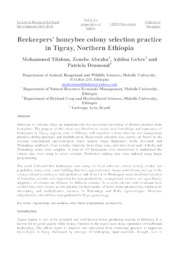Beekeepers' honeybee colony selection practice in Tigray, Northern Ethiopia.
Beekeepers' honeybee colony selection practice in Tigray, Northern Ethiopia.
Author(s): TILAHUN, M.; ABRAHA, Z.; GEBRE, A.; DRUMOND, P. M.
Summary: Selection of colonies plays an important role for successful harvesting of desired products from honeybees. The purpose of this study was therefore to assess local knowledge and experience of beekeepers in Tigray regional state of Ethiopia with regard to colony selection and management practices during purchase and multiplication. Respondent selection was carried out based on the existing conventional agroecological zones namely Dega (highland), Kolla (lowland) and Weinadega (midland). Four woredas (districts) from Dega zone, and three from each of Kolla and Weinadega zones were sampled. A total of 185 beekeepers were interviewed to understand the criteria they were using to select colonies. Preference ranking data were indexed using linear programming. The result indicated that beekeepers were using six local selection criteria namely worker bee population, body color, comb building direction, aggressiveness, honey yield history and age of the colony ordered according to their preference rank from 1 to 6. Beekeepers understood that selection of honeybee colonies was important because productivity, management easiness and agroclimatic adaptation of colonies are different for different colonies. As a result colonies with dominant black colored bees were chosen as first priority for their merits of better honey productivity, tolerance to absconding and multiplication easiness in Weinadega and Kolla agroecologies. However, red/yellowish colored bees were preferred in Dega agroecology.
Publication year: 2016
Types of publication: Journal article
Unit: Embrapa Acre
Keywords: Abelha, Apicultores, Apicultura, Apiculture, Beekeepers, Colonias de abejas mielíferas, Colônia, Criterio de selección, Etiópia, Honey bee colonies, Linear programming, Método de otimização, Optimización de los sistemas, Pequeno produtor, Programación lineal, Programação linear, Selection criteria, Seleção, System optimization, Tigray
Observation
Some of Embrapa's publications are published as ePub files. To read them, use or download one of the following free software options to your computer or mobile device. Android: Google Play Books; IOS: iBooks; Windows and Linux: Calibre.
Access other publications
Access the Agricultural Research Database (BDPA) to consult Embrapa's full library collection and records.
Visit Embrapa Bookstore to purchase books and other publications sold by Embrapa.

